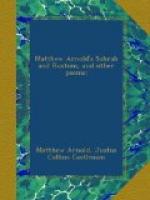“Come, join the melancholious
croon
O’ Robin’s reed.”
=20. Potsdam.= The capital of the government district of Potsdam, in the province of Brandenburg, Prussia; hence the dog’s name, Kaiser.
=41. the Grand Old Man.= Gladstone.
=50. agog.= In a state of eager excitement.
=65. Geist.= Also remembered in a poem entitled Geist’s Grave, included in this volume.
=76. chiel.= A Scotch word meaning lad, fellow.
“Buirdly chiels
an clever hizzies.”
—BURNS,
The Twa Dogs.
=Skye.= The largest of the Inner Hebrides. See note, l. 7, Saint Brandan.
THE LAST WORD
In this poem Arnold describes the plight of one engaged in a hopeless struggle against an uncompromising, Philistine world too strong for him.
State the central thought in the poem. To whom is it addressed? What is the narrow bed, l. 1? Why give up the struggle? With whom has it been waged? Explain fully l. 4. What is implied in l. 6? What is meant by ringing shot, l. 11? Who are the victors, l. 14? What would they probably say on finding the body near the wall? Can you think of any historical characters of whom the poem might aptly have been written?
[189] PALLADIUM
At the time of the Trojan war there was in the citadel of Troy a celebrated statue of Pallas Athene, called the Palladium. It was reputed to have fallen from heaven as the gift of Zeus, and the belief was that the city could not be taken so long as this statue remained within it. Ulysses and Diomedes, two of the Greek champions, succeeded in entering the city in disguise, stole the Palladium and carried it off to the besiegers’ camp at Argos. It was some time, however, before the city fell.
=1. Simois.= A small river of the Troad which takes its rise in the rocky, wooded eminence which, according to Greek tradition, formed the acropolis of Troy. The Palladium was set up on its banks near its source, in a temple especially erected for it (l. 6), and from this lofty position was supposed to watch over the safety of the city and her defenders on the plains below.
=3. Hector.= Hector, son of Priam, king of Troy (Ilium), and his wife, Hecuba, was the leader and champion of the Trojan armies. He distinguished himself in numerous single combats with the ablest of the Greek heroes; and to him was principally due the stubborn defence of the Trojan capital. He was finally slain by Achilles, aided by Athene, and his body dragged thrice around the walls of Troy behind the chariot of his conqueror.
=14. Xanthus.= The Scamander, the largest and most celebrated river of the Troad, near which Troy was situated, was presided over by a deity known to the gods as Xanthus. His contest with Achilles, whom he so nearly overwhelmed, forms a notable incident of the Iliad.




